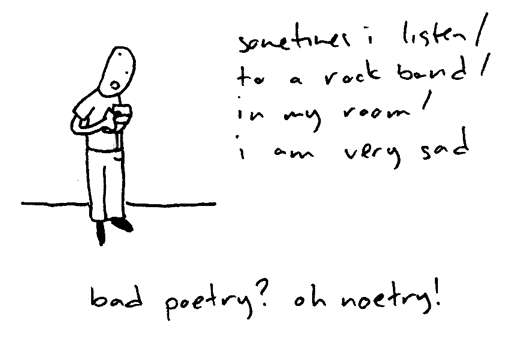 |
| Comic by Toothpaste For Dinner |
Billy Collin's poem Workshop is an excellent example of humor and self consciousness done right. The poem itself is about the act of critiquing one's own work and the work of others. It is incredibly clever, with lines in it that reveals some of the truth of the process of critiquing using humor as a tool. The first few lines set the rhetorical tone for the piece: "I might as well begin by saying how much I like the title./It gets me right away because I’m in a workshop now/ so immediately the poem has my attention".
I was grinning right away because even though I may not have heard this exact phrase before, I know I have in some form or another. The diction in this is important as well because it reinforces the rhetoric by lending a "common" voice to the speaker of the poem - it is clearly meant to be a person in a workshop critiquing a poem. From the perspective of self-consciousness, the choice of this person as the speaker of the poem is important; the tone of the poem with this content changes dramatically with changes in the speaker.
The trope of a student/work-shopper continues throughout the poem. Lines like the following ones again bring humor and rhetorical perspective: "I like the image of clouds flying like lozenges/which gives me a very clear picture."
What I found interesting in this line though is that is was one of the strongest, image-wise, but it still doesn't diverge from the rhetorical stance that the poem has created. It also is hilarious. I can hear someone saying this in class and if I'm honest, it's one of those comments that makes me feel like maybe we bullshit each other a bit too much at times. On the other hand, it reveals the literal self-consciousness that students of poetry share. We aren't experts, and for the most part, we're just responding to what we like. This thread is picked up again and again in this poem, tying various levels of self-consciousness, the figurative, in the perspective of the speaker and the literal in the diction of the poet, which is especially illustrated in the fifth stanza:
Maybe it’s just me,
/.../
And what’s an obbligato of snow?
Also, I roam the decaffeinated streets.
At that point I’m lost. I need help.
The concept of "self-consciousness" is very evident in this poem. Diction choices like "obbligato" and "decaffeinated" show an attention to detail in this poem but also points to the pit-falls of over-working. It proves that there is a place for it and that it is effective when not over-done. I think if it were written without out it, it wouldn't be as effective because it takes attention to detail and consistency of voice in this poem for the humor and rhetoric to be successful. Otherwise it could turn into pure absurdity, flat and uninteresting, or come of as heavy-handed and condescending.
No comments:
Post a Comment